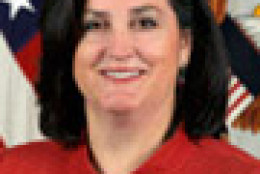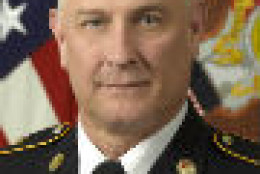Army
-
You might remember Charla Nash. She's the woman who was horribly disfigured when attacked by a friend's pet chimpanzee back in 2009. The Pentagon has been closely watching her long recovery. More than watching, actually. The Army has paid hundreds of thousands of dollars of Nash's medical bills. The hope is Nash's ordeal can help the military learn to care for disfigured soldiers returning from war. Dr. Wendy Dean, a medical advisor in the Army's Tissue Injury and Regenerative Medicine Program Management Office, joined Tom Temin on the Federal Drive with more on the effort and what the military hopes to learn.
March 17, 2015 -
The Army is moving hundreds of millions of dollars to the OASIS professional services government-wide contract. The Army and the General Services Administration signed a memorandum of understanding Monday with new incentives to use OASIS. Federal News Radio's executive editor Jason Miller joined Tom Temin on the Federal Drive with details on the new agreement.
March 17, 2015 -
Cuts to service contracts are part of an Army-wide push to use soldiers and civilians for jobs that had been outsourced by necessity during wartime, officials said Wednesday.
March 12, 2015 -
The Army says it's in the midst of a significant reduction in its spending for service contractors -- including a $2 billion cut to logistics support contracts that officials expect to double in the coming years. As Federal News Radio's Jared Serbu reports, most of the work they're performing will be handed over to soldiers and Army civilians.
March 11, 2015 -
The military already has shown it can improve services on bases through public-private partnerships. As budgets shrink, the next task is to partner with local governments.
March 11, 2015 -
After two years of operating under sequestration level funding, the Army now faces a $3 billion maintenance backlog and 5,500 work orders, said Katherine Hammack, assistant secretary of the Army for installations, energy and environment.
March 05, 2015 -
The Defense Department will close 15 sites in Europe over the next two years. The Department expects the European Infrastructure Consolidation to save $500 million a year. Katherine Hammack is assistant secretary of the Army for Installations, Energy and Environment. On In Depth with Francis Rose, she shared the details on this and DoD's other cost-saving plans.
March 04, 2015 -
Cyber challenges are more prevalent than ever. That's driving the need for more people with the professional skills necessary to prevent and mitigate attacks. To that end, the Army Reserve has launched a new partnership to build its network of cyber warriors. The program is designed to train soldiers in cyber warfare — for both the Reserve and private sector employers. Lt. Col. Scott Nelson is the Army Reserve's Cyber P3 Program Manager. He joined the Federal Drive with Tom Temin with more on how it all works.
February 26, 2015 -
Bloomberg Government analysts Robert levinson and Cameron Leuthy join host Roger Waldron to to talk about what's in the fiscal year 2016 defense budget. February 24, 2015
February 24, 2015 -
Edward Snowden and Bradley Manning personify the concept of the insider threat. Defending against that threat is now one of the highest priorities for the military and intelligence communities. Retired Army Maj. Gen. Steven Smith is former chief information security officer for the Army. He's now Security Technology Adviser to Metalogix. Pat Park is vice president for public sector at Metalogix. On In Depth with Francis Rose, they explained how agencies can tackle the different types of insider threats.
February 19, 2015 -
The Army's been working for the past several years on a more "comprehensive" approach to fitness — instead of one that measures how many pushups a soldier can do or how quickly she can run a mile. But when it comes to the overall health of the force, the Army's surgeon general says her biggest concern is how much sleep soldiers are getting each night. It's not enough. Federal News Radio's Jared Serbu writes about it in this week's edition of inside the reporter's notebook. He joined Tom Temin on the Federal Drive to explain.
February 10, 2015 -
The Army's been working for the past several years on a more "comprehensive" approach to fitness, instead of one that measures how many pushups a soldier can do or how quickly he can run a mile. But when it comes to the overall health of the force, the Army's surgeon general says her biggest concern is how much sleep they're getting. It's not enough. Federal News Radio DoD Reporter Jared Serbu writes about it in this week's edition of Inside the DoD Reporter's Notebook.
February 06, 2015 -
The Army is revisiting its approach to mission command and leaning on improved IT networks as one way to make its forces more flexible.
February 06, 2015 -
The Army's budget request details a branch in transition, from both a military and financial perspective.
February 05, 2015 -
Friday is the last day of service for Sergeant Major of the Army Ray Chandler. He will retire as the top enlisted man in the Army after nearly 34 years of service. He's the 14th Sergeant Major, and his main job is advisor to Army Chief of Staff General Ray Odierno. On In Depth with Francis Rose, he shared what thoughts are top-of-mind for him as he prepares to wind down his service.
January 28, 2015









